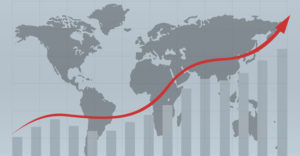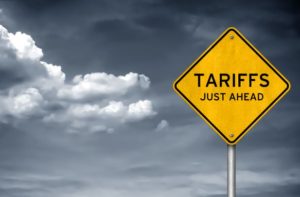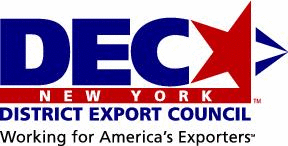NY District Export Council Letter to President Trump: Reconsider Tariffs Negatively Affecting US Exports
The New York District Export Council (NYDEC), of which Dorian Drake’s CEO Ed Dorian Jr. is a member, recently sent a letter to U.S. President Donald Trump imploring him to reconsider the tariffs his administration is imposing on Chinese imports. The letter, which was subject of media coverage after it was released in late July, echoes concerns Mr. Dorian wrote about in two blog posts published after the initial tariffs went into effect last year.

|

Import tariffs, at least for now, |
NYDEC is a private, non-profit organization whose mission is to encourage and support New York exporters and, by doing so, create jobs and stimulate New York economic growth. Council members are appointed by U.S. Secretary of Commerce and tasked to provide support, advice, and assistance to New York exporters. The New York council is one of 58 such councils situated throughout the United States, Puerto Rico, and the U.S. Virgin Islands.
The Letter, sent by NYDEC chairman Joseph Schoonmaker on July 22, 2019, appears below:
——————————————————
Dear Mr. President:
We wish to introduce the New York District Export Council (NYDEC) whose mission is to provide leadership, education, and assistance to SMEs in the New York City metropolitan area and eastern New York State, up to the Canadian border, on all aspects of the export process. NYDEC’s goal is to provide the vision and describe opportunities where joint efforts among the public, private, and government sectors can significantly expand exports from the New York region and increase well-paying jobs.
We support obtaining better access for US exports to China, India, the rest of Asia, Canada, Mexico, European Union, Africa, etc. and better intellectual property protection for exports into these countries. However, we are concerned that the remaining portion relating to enforcement through unilateral determination and non-retaliation may be the most challenging one to conclude, leading us to focus on the continued additional tariffs on thousands of products from China and the continued tariffs on steel and aluminum from our trading partners that could further adversely impact the New York farmers and manufacturers. The tariffs are negatively affecting NYDEC’s efforts to promote economic prosperity and enhance job creation through exports from the U.S.:
Tariffs on equipment to manufacture in the US and imports used to manufacture finished products in the US will likely impede growth in US manufacturing because these costs are increasing and reducing productivity. For example, the list of goods subject to the Section 301 tariff includes products classified under chapter 84 of the Harmonized Tariff System of the United States. Such products include manufacturing equipment, such as textile spinning machines, textile printing machines, machinery for producing textile yarns, circular knitting machines, warp knitting machines, flat knitting machines, braiding and lace braiding machines, and embroidery machines important to the large fashion and related industries in the United States. U.S. companies, not Chinese companies or the Chinese government, pay these additional tariffs.
In the past 25 years, U.S. exports increased five-fold from $224 billion to more than $1.1 trillion. About one of every five or twenty per cent of all jobs in America’s manufacturing sector depends on exports, whose workers typically receive wages eighteen per cent higher than the national average. Trade supports approximately 2.3 million jobs across New York State.
As a large producer of agricultural products and emerging manufacturer of renewable energy as well as preeminent fashion capital, the New York economy plays a major role in our country’s international trade. The increased cost of imports along with the tariffs is causing New York companies to increase their costs and therefore their prices for their exports or bear the squeeze in margins. In these cases, New York exporters are either losing sales or are at the crossroads of risking their customer relationships. The group, Tariffs Hurt the Heartland, stated that through December 2018, New Yorkers paid $463 million dollars in additional tariffs. In addition, some $12 billion in subsidies to farmers throughout the United States were announced by the U.S. Department of Agriculture on 27 August 2018 at the cost of American taxpayers. The continued tariffs have only increased those amounts.
In addition, U.S. exporters are subject to retaliatory tariffs by our trading partners, including the EU, Canada, Mexico and China. These tariffs are a significant part of the cause for the decrease in U.S. exports. And through December, New York exporters already had faced $223 million dollars in retaliatory tariffs. Cumulatively, New York exporters faced a 20% drop in exports. Together with the increased cost of imported components, the retaliatory tariffs are shrinking the markets for U.S. goods.
China is also lowering their tariffs for products from other countries, giving competitors to U.S. companies an additional advantage.
Finally, the subsidies paid by the US government to the US farmers are impacting the U.S. fiscal budget and that compounds the cost of the tariffs. New York farmers are the ones paying their share instead of the Chinese as initially presented. This has long-term international business relationship consequences between the farmers and their Chinese customers.
The continuation of these additional tariffs, the uncertainty of a positive result of the current negotiations with our trading partners and the looming threat of the U.S. placing additional tariffs on the rest of the products imported from China make it very difficult for New York exporters to plan and expand their businesses. In fact, rather than bringing manufacturing back to the U.S. there are New York exporters that have suspended their expansion and additional hiring plans and are contemplating personnel lay-offs. Worse, we also know of U.S. companies currently importing to manufacture or process a finished product in New York State for export, that are transferring those U.S. operations abroad to avoid the tariffs on Chinese products.
We urge you to reconsider these tariffs that negatively affect US exporters and undertake a multilateral approach to address fair trade among the United States, China, and the rest of the world.
Thank you for your consideration.
Sincerely,
Joseph E. Schoonmaker
Chair of the New York District Export Council
cc: Hon. Wilbur Ross, Secretary of Commerce
Ambassador Robert Lighthizer, USTR





